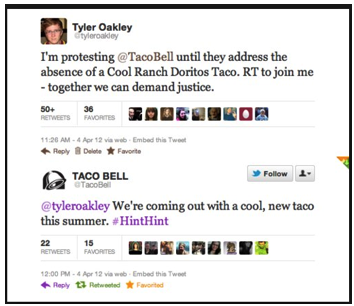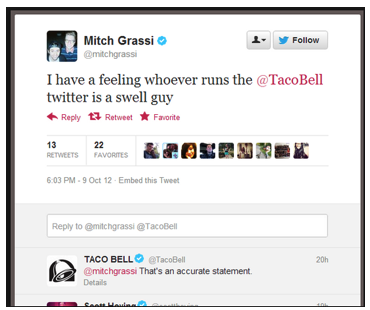In Advice to a Young Tradesman, Written by an Old One, Benjamin Franklin coined the phrase "Time is Money." If he were to rewrite this book today, a chapter focused on social media might be titled, "Social media is time. Social media is a mystery regarding money. #YOLO".
Social media can be a boon to your business, but finding your particular path to success can be filled with roadblocks and detours. While there are several social media strategies your business can employ, they all stem from two distinct paths: content sharing and content creating. The difference is simple; sharing content means reposting others' work, while content creating means being the original author. Both approaches have pros and cons depending on your goals, as well as the social media platform you are using. But which strategy delivers the best ROI? How can you track your social media results? And how can a business profit (or even know whether it's profiting) from its social media presence?
Unfortunately, there is no single answer to these questions, or even a true definition of what social media ROI is. All you can do is identify your specific social media goals and track results to ensure you are achieving them. Since the goal of being a content sharer is to start a conversation, it's unlikely a business with this approach would utilize social media as sales catalyst. Content creators, on the other hand, expect their posts (daily deals, Facebook giveaways, etc.) to lead directly to conversions. Typically businesses that employ this approach have an eCommerce platform on their website. Broadly speaking there are a few factors that can be measured and improved for one's social media presence: The amount of traffic its links and posts generate (both organic and paid), engagement, which includes sign-ups and conversions as well as comments, and profit.
Traffic (Reach) - We hate it on the freeway, but our business needs it on the web
Like all web-based marketing, knowing where visitors come from is crucial to understanding your ROI. Deploying a unique URL can help you measure traffic and referrals for any given campaign. Creating a unique URL is not hard to do. Google Analytics offers free URL builders for this very purpose. Simply fill out the form, copy and paste the URL, and stay consistent with your linking strategy. If you're a dental practice offering a deal on whitening, make sure you use the same link. Remember, more information means more refined results. Consider using different URLs across your different social media platforms. Google Analytics provides a variety of metrics you can leverage to inform which types of posts to continue writing and which you should move away from.
Top social media platforms such as Facebook and Twitter provide plenty of useful metrics, some of which are specific to individual posts. Facebook Insights breaks down total engagement of each post and page. Twitter Analytics, which needs to be "turned on" for your account, provides similar stats relating to engagement and, more importantly, impressions. Instagram currently does not have its own analytics, but sites like OnlyPult provide solid metrics for the platform. Instagram is in the process of rolling out ads, so analytics are likely to follow.
Expanding your business's social media reach is a lofty yet attainable goal that's highly necessary for content sharers gunning for the coveted title of "influencer." The first step to improving your reach is simply to improve your social media. When done right, social media puts the brand to work for its customers. This process become easier when businesses starts to pay attention to which posts have received the most views/responses and caters future posts to be similar. Reach, in the end, does not equal revenue. Instead, the measurement is about retention. How big your business's social reach can become is up to you. It takes time, but keeping an eye on what's succeeded for you and others, as well as what's trending, can elevate your social clout.
Engagement - Engagement is great, but more often than not, it's not profitable.
While each social media site provides analytics for engagement, how do they translate to your bottom line? Social media is a marketing environment camouflaged as consumer-friendly hangout. Tracking the number of comments your posts receive is a decent metric, especially for larger companies. Smaller companies, on the other hand, tend to panic when their daily posts receive minimal comments, and this panicking is foolish.
Do not put too much stock into the number of comments your page receives. Content sharers thrive on engagement, while content creators tend to struggle. Sharing content is easier since it is merely reposting a conversation and asking for other's opinions. People on the web, more often than not, love to share their opinion. Promoting your own business and deals is not a conversation starter; they are matter-of-fact posts. It's more likely a mother of two notices the local dentist's post stating, "Bring in your family for a checkup and get 2nd checkup later in the year for half-off," and does not engage online. Instead, she tells her friends and family offline, a form of engagement Facebook Analytics cannot measure. When writing these posts consider creating unique coupons your patrons must present in order to get the deal, and always ask them how they found it. Where the Internet fails you, communicating in person may provide some answers.
Many marketers and small businesses think the worst thing a post can do is get no responses, and they are dead wrong. We are talking about the Internet here, where anonymity and bullying go hand-in-hand. Posts typically do not go viral because of how great they are. Be careful of how you phrase your deals and what type of posts you share. While minor mistakes such as grammar errors can cause undesired attention, big errors get hit the hardest.
So you've measured your pages' engagement and want to improve. Well, a good place to start is to return the favor. Respond to everything. If people are happy, thank them. If they are upset, apologize and try to mitigate the problem. A lot of bigger brands' social media teams thrive on this concept. There's a reason Taco Bell's Twitter has more than 1.5 million followers; the fast food chain responds to fans in a humorous yet meaningful way.
Profit - Social media's return on investment...where is my money going?
To reiterate, your money is going where you put it and the results are not always directly related. You need to define your social media goals. Blindly promoting posts every now and then will not yield adequate metrics to measure your ROI. Pick a goal, measure and adjust your strategy. No social media webinars, demos or for this matter, blog posts, will reveal the true ROI of your social spending. Think about your current customers, potential customers, and decide which path is best for your social media, and then attack it. Use free online tools and make sure you're hitting your benchmarks.
Be ready to change your efforts when they fail. While it hurts that there is no 1:1 way to measure your actual social media ROI, knowing what you want, tracking your steps, adjusting, and using the plethora of online tools available will allow your business to improve its social presence.
Even if you don't spend money on promoted posts, you are still spending time, which Benjamin Franklin claims is money. So be sure to spend your time appropriately and start each month with a goal. Identify where you are, decide what you want to be, monitor your analytics and always be ready to adjust.
Josh Gershonowicz is the Founder/CEO of Rebuild Nation. Rebuild Nation is a Marketing, Strategy, and Analytics company that does traditional and digital execution, primarily within the health care industry. For more information on social media, and marketing visit www. RebuildNation.com



